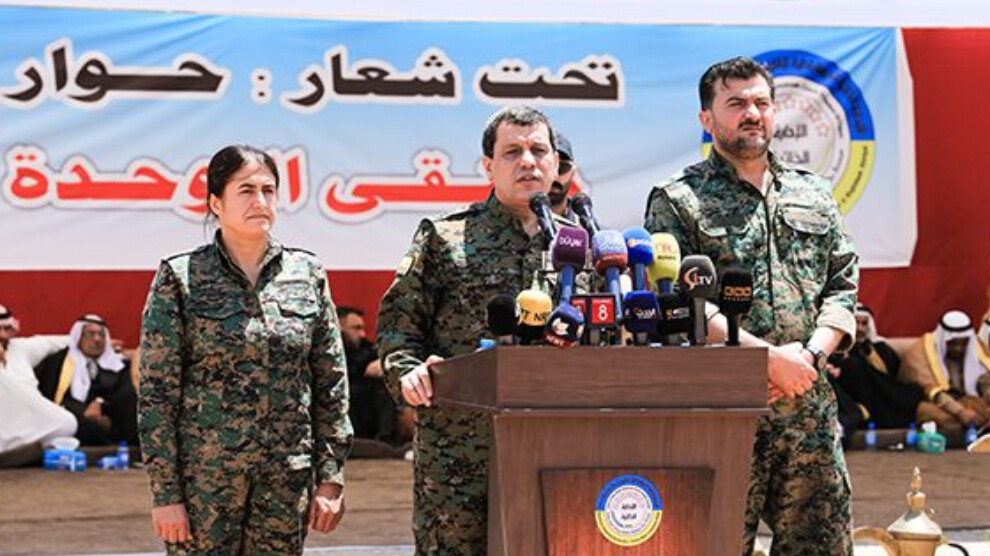SDF Commander-In-Chief: Any solution for Syria must constitutionally recognize our institutions
SDF Commander-in-Chief Mazloum Abdi said: "Syria cannot return to its former state and live under a centralized system.”
SDF Commander-in-Chief Mazloum Abdi said: "Syria cannot return to its former state and live under a centralized system.”

On May 25th, a Tribal Forum convened in al-Hasakah City under the slogan “Dialogue, Security, Construction for a Unified and Decentralized Syria.” The forum welcomed a broad range of attendees, including SDF (Syrian Democratic Forces) Commander-in-Chief Mazloum Abdi and members of the General Command, the joint Presidency of the Syrian Democratic Council and Executive Council of the Autonomous Administration, religious figures: Yazidi, Christian, and Islamic clerics, social figures from Kurdish, Arab, Syriac, Assyrian, Turkmen, Circassian, and Armenian communities, women’s organizations, academics and intellectuals, and tribal leaders: sheiks and dignitaries from most Syrian tribes across Kurdish, Arab, and other components.

SDF Commander-in-Chief Mazloum Abdi delivered a speech in which he welcomed the attendees and expressed hope that “this forum will be a springboard for resolving our country’s crisis, establishing stability throughout Syria, and initiating a political solution.” He emphasized the core principles of the Syrian Democratic Forces and the Autonomous Administration: remaining “steadfastly neutral in the sectarian and ethnic conflicts that have ravaged Syria’s national and social fabric.”
Abdi stressed the importance of Syrian territorial unity, and noted that “Syria cannot return to its former state and live under a centralized system.” He said he believed a new Syria must be built, one that guarantees the rights of all its people and recognizes the “gains achieved by the people of north and eastern Syria with their blood. He stated that these gains include the establishment of their own institutions that deserve constitutional recognition in any future Syrian solution.

Abdi emphasized the interconnectedness of northern and eastern Syria, stating, “The future of the people in these regions is linked to each other, and the issue of one region cannot be resolved in isolation from the other.” He also declared their resolve to defend the region from external attacks, while simultaneously advocating for de-escalation from all sides.
Abdi pointed a critical finger at external actors, stating that “regional and international interventions have been the main reason for deepening the political crisis and the obstacle to a solution.” He specifically condemned Turkey’s attacks and occupation of Syrian territory, declaring it “unacceptable.” Abdi called for the occupation to end and for the displaced Syrians to be able to return “to their homes with honor and dignity.”

Abdi added, “We declare from here that we are in favor of dialogue with all parties, including Turkey.” He also acknowledged the ongoing threat of ISIS, stating: “The threat of the ISIS terrorist organization still exists. We continue to participate with our partners in the international coalition in the fight against this terrorist organization.'”
At the end of his speech, Commander-in-Chief Mazloum Abdi said, “We are committed to our promises to the tribal leaders and elders, and we seek to work on realizing their demands.”
A number of other speeches were delivered by officials, tribal leaders, and religious figures. These speeches all focused on themes of community cohesion, national unity, and the rejection of violence and extremism.

The forum issued a public statement acknowledging the sacrifices made by the components of north and eastern Syria in fighting terrorism and Turkish aggression. The statement emphasized the role of the Autonomous Administration in preserving the region’s social fabric and civil peace. Looking ahead, the statement also referred to the upcoming local administration elections scheduled for next month in north and eastern Syria.
The statement also praised the heroic role of the Syrian Democratic Forces and the Internal Security Forces (ISF) in defeating terrorism and confronting the Turkish occupation. It emphasized that the Turkish occupation is a major obstacle to resolving the Syrian crisis. The statement condemned the Turkish occupation’s violations, demographic changes, forced displacement of the indigenous population, and daily practices in occupied areas, considering them “war crimes.”

The statement concluded with a call for dialogue between Syrian parties to reach a Syrian-led national solution to the crisis. It stressed the importance of avoiding hostile policies that aim to create instability and undermine security in north and eastern Syria. The statement called on the Arab League to play a role in resolving the Syrian crisis.
The tribal forum concluded yesterday afternoon with the following key outcomes:
- The forum extended a hand for peace and open dialogue to build good neighborly relations with countries in the region.
- The forum emphasized the importance of Syrian unity and called for an end to violence between Syrians.
- Combating Terrorism and Discrimination: The forum rejected terrorism and discrimination based on nationality, religion, or gender.
- The forum affirmed its belief in democratic values, human rights, and citizen freedoms.
- The forum advocated for a unified, decentralized Syrian state that accommodates all Syrians.
- The forum called for considering an amnesty for those who haven’t committed serious crimes and have been rehabilitated.
- Improved Living Conditions: The forum stressed the importance of developing and providing essential services to improve daily life.
- Focus on Agriculture and Economy: The forum highlighted the importance of the agricultural sector, livestock, and other key sectors to the economy.
- Reconsidering the issue of internal displacement, whether in camps or host communities for those who wish to voluntarily return to their original place of residence.
- Combating narcotics by all possible ways and means, due to the dangers it poses to the future of the Syrian people.